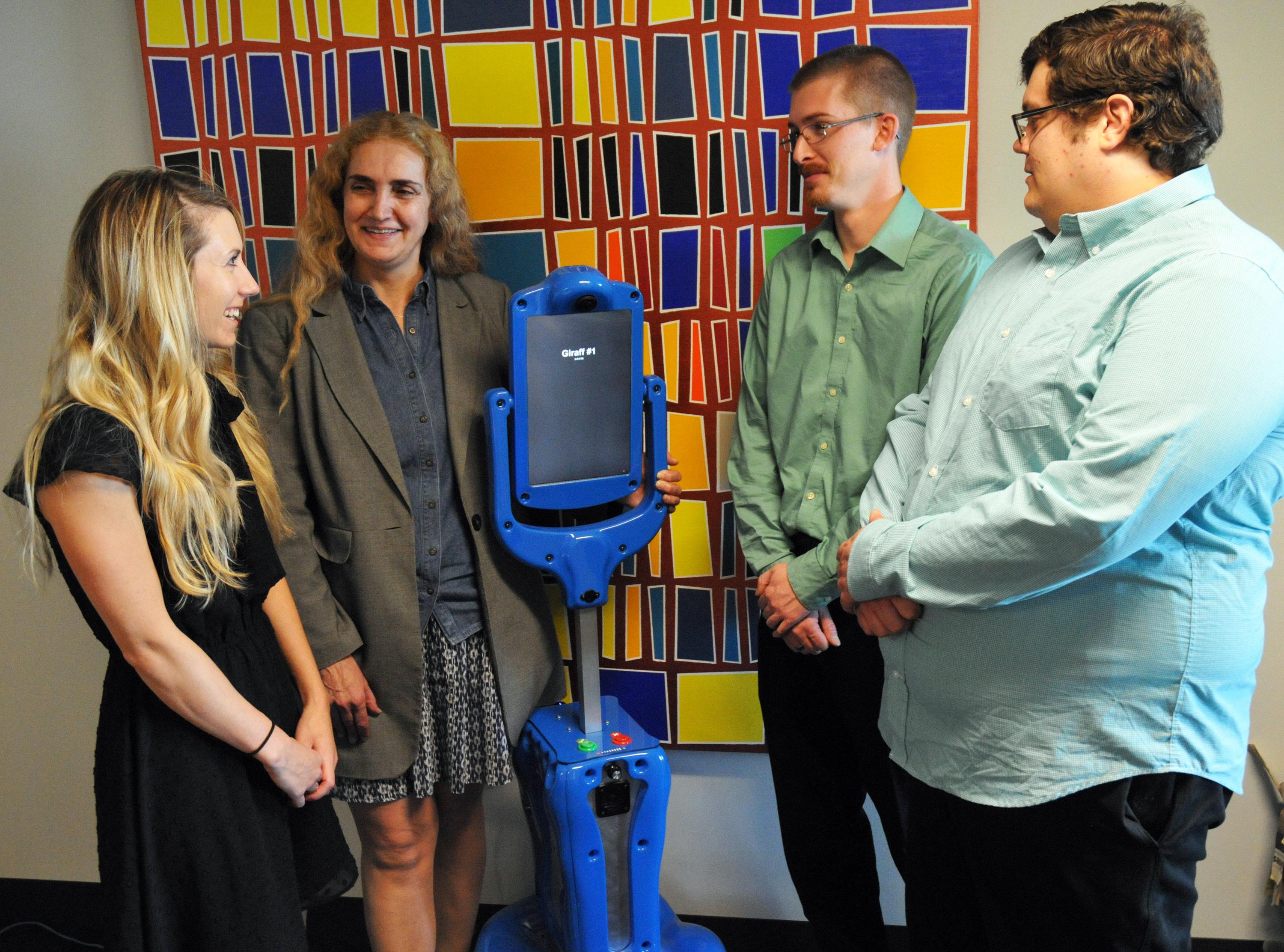Healthcare and data—SUNY Oswego computer science faculty member Isabelle Bichindaritz (second from left) speaks about the new graduate degree program in biomedical and health informatics with graduate students (from left) Cassie Breen, Christopher Bartlett and Logan Wells, all of whom have expressed interest in the program, which can prepare graduates for many careers, including development of innovations in telemedicine—represented by the Giraff, a Swedish-made robot—and other healthcare fields.
Healthcare in the digital era—telemedicine, big data, decision analytics, computer networks integrating patient and caregiver information, and more—has led to the launch of SUNY Oswego’s newly approved graduate degree in biomedical and health informatics.
The new master of science degree program can be achieved online or in face-to-face form through the main campus and/or SUNY Oswego’s branch campus in Syracuse.
“It’s very exciting, because I’ve been working on this since I arrived in 2012,” said computer science faculty member Dr. Isabelle Bichindaritz, director of the program.
Biomedical and health informatics (BHI) studies the flow of information in healthcare and public health. Students explore techniques for assessing information practices, evaluating needs of providers and patients, and developing technology to address issues the industry is facing.
Brad Korbesmeyer, interim dean of graduate studies, said the program helps students meld the theoretical with the applied in many high-demand fields that depend on health information.
“The more potential students are finding out about it, the more excitement it is generating,” Korbesmeyer said. “Today’s graduates want a discipline that positions them for a career of innovation and fulfillment as well as great employment prospects. BHI speaks to those desires.”
Potential careers for graduates abound, from improving both the effectiveness and the efficiency of clinical practices to developing systems that help doctors make data-informed decisions about patient care, from analyzing masses of data that unveil patterns in public health to helping identify which genes are most responsible for the progression of cancers.
Interested students
Human-computer interaction graduate student Christopher Bartlett, a May alumnus in cognitive science, said he has applied for the new degree program in biomedical and health informatics.
“The primary goal eventually is to apply for a Ph.D. program in neuroscience,” Bartlett said. “Broadly, I hope to couple it with some sort of technology, such as bioengineering or biotechnology.”
Also enrolled in the college’s graduate certificate program for health information technology, Bartlett saw vividly how data could assist medical research when he did a 2015 summer research internship at SUNY Upstate Medical University in Syracuse. As a research assistant to Dr. Daniel T’so of the neurosurgery department, Bartlett was able to do pixel-by-pixel analysis of multiple, timed images to see changes in retinal blood flow as stimuli were applied.
Formally launching for the spring semester, the program is so far along in its development—thanks to SUNY grants and earlier creation of graduate certificate offerings in health information technology and integrated health systems—that one student, Cassie Breen, has taken all of the courses needed to earn the new degree at this month’s Commencement, Bichindaritz said.
Breen, already a December candidate for the human-computer interaction degree, can apply for the first degree the college awards in the new BHI program. She aims for a career in big data, perhaps in biomedical informatics involving electronic health records systems, “working with health care organizations trying to take the data out and apply it,” Breen said
Three tracks
The BHI degree is offered in three tracks—health informatics: intelligent health systems; health information management: health data science; and health informatics professional (professional science master’s) focusing on the business management and administration approach to health informatics.
Numerous healthcare and economic development organizations endorsed the regional need for the new program, and an advisory board of experts in the field is in formation. BHI’s development also has benefited from a number of grants, including a SUNY Innovative Instruction Technology Grant to develop online courses for biomedical informatics and two SUNY High Needs Grants for online software accessibility, virtual labs and hiring faculty and staff. Two additional pending grants include a SUNY Labs to Jobs Consortium Grant partnering SUNY Oswego, Upstate Medical University, Onondaga Community College, SUNY College of Environmental Science and Forestry, and SUNY Morrisville in the creation of seven new advanced labs across the region, and a SUNY Performance Fund Grant to create the Institute for Precision Medicine at Upstate Medical University.
For detailed information on the biomedical and health informatics program, contact Bichindaritz at ibichind@oswego.edu. For information on enrolling in the program, visit oswego.edu/bhi or call the Division of Graduate Studies at 315-312-3152.




